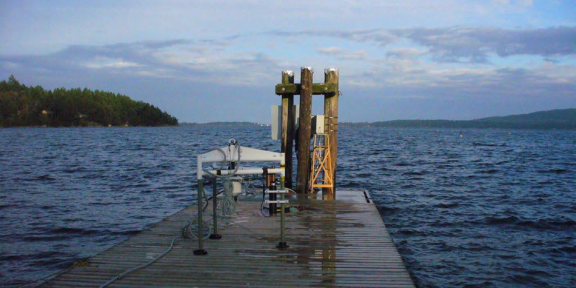50p

Sea Experiment
This week a team of scientists from the University of Victoria gave a training system to launch the underwater observatory that was recently installed on the sea bed at the end of the North dock.
They showed us how to use the extensive array of instruments that measure all manner of sea conditions from temperature and salinity to chlorophyll and oxygen concentrations. This window on the underwater conditions is complemented by an above water weather station which also sends data to a website that is accessible to the public. Students from Brentwood as well as anyone across the globe will be able to access and analyse this information. Adding greatly to the experience is a camera which can be controlled by some users, such as BCS teachers. If you are interested in logging on to the website please click here and register as a user.
This system was generously funded by a grant to UVIC by CANARIE (Canada’s Advanced Research and Innovation Network) with the express intention of engaging young people in particular in ocean research and education. At all grade levels next year our science curriculum will contain elements of data analysis that will help students explore the rich stream of information coming from the instrument package.
The data forms part of the “Venus” array of nodes which exist in the Saanich Inlet and Fraser Estuary. A similar set of nodes make up the “Neptune” array that also provides seismic information off the West Coast of Vancouver Island. Video footage from Brentwood’s camera will be archived and soon incorporated into the educational “crowd-sourcing” website called “Digital Fishers” where observers can “tag” organisms they identify from the video clips. In a game-like environment students can move through the levels to collect points and rewards by developing their knowledge of species and their interactions.
With our oceans under threat from many directions, a greater appreciation of, and interaction with, what lies below the surface may be just what we need to raise awareness of these pressing environmental issues.
Mr. David McCarthy, Director of Academics
They showed us how to use the extensive array of instruments that measure all manner of sea conditions from temperature and salinity to chlorophyll and oxygen concentrations. This window on the underwater conditions is complemented by an above water weather station which also sends data to a website that is accessible to the public. Students from Brentwood as well as anyone across the globe will be able to access and analyse this information. Adding greatly to the experience is a camera which can be controlled by some users, such as BCS teachers. If you are interested in logging on to the website please click here and register as a user.
This system was generously funded by a grant to UVIC by CANARIE (Canada’s Advanced Research and Innovation Network) with the express intention of engaging young people in particular in ocean research and education. At all grade levels next year our science curriculum will contain elements of data analysis that will help students explore the rich stream of information coming from the instrument package.
The data forms part of the “Venus” array of nodes which exist in the Saanich Inlet and Fraser Estuary. A similar set of nodes make up the “Neptune” array that also provides seismic information off the West Coast of Vancouver Island. Video footage from Brentwood’s camera will be archived and soon incorporated into the educational “crowd-sourcing” website called “Digital Fishers” where observers can “tag” organisms they identify from the video clips. In a game-like environment students can move through the levels to collect points and rewards by developing their knowledge of species and their interactions.
With our oceans under threat from many directions, a greater appreciation of, and interaction with, what lies below the surface may be just what we need to raise awareness of these pressing environmental issues.
Mr. David McCarthy, Director of Academics